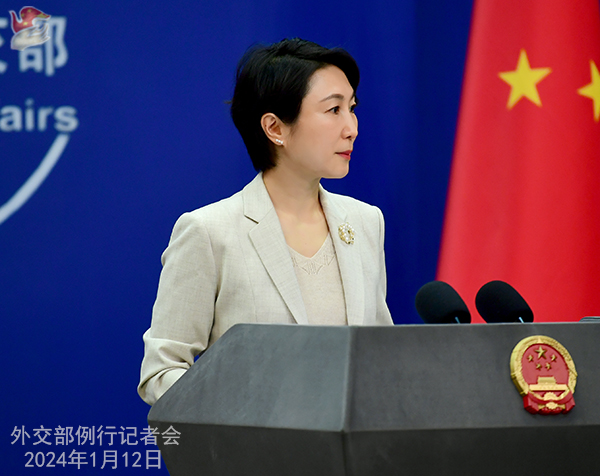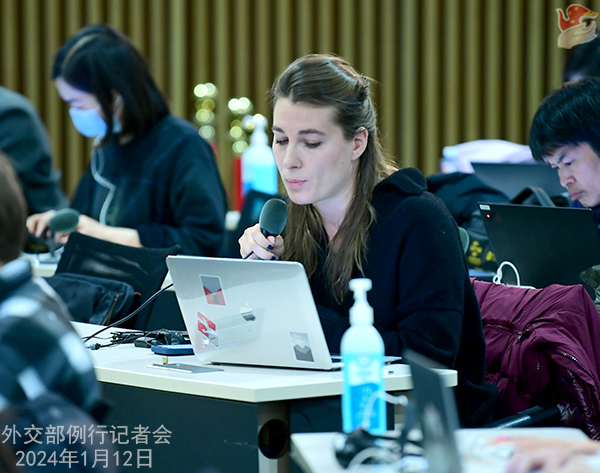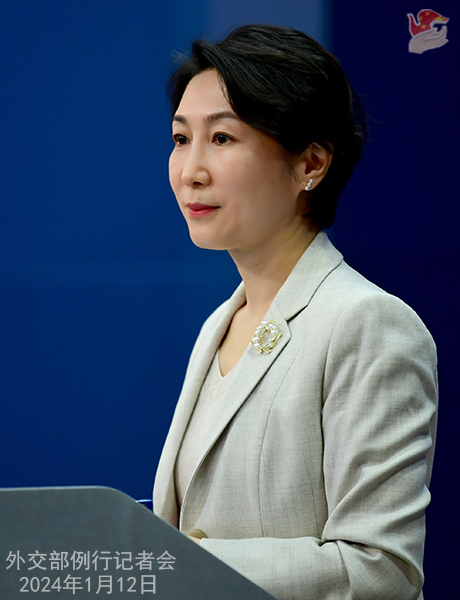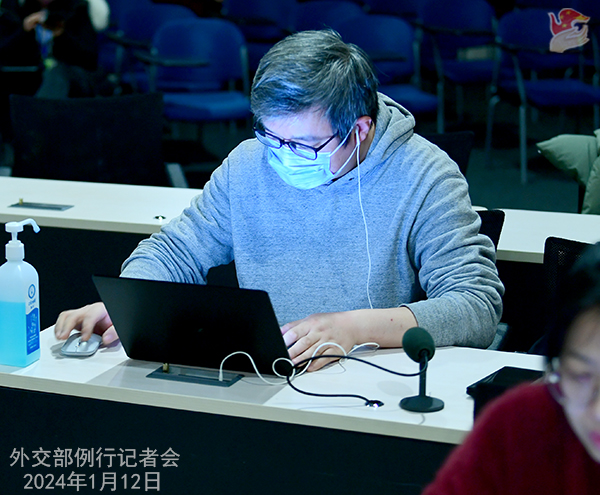| Foreign Ministry Spokesperson Mao Ning’s Regular Press Conference on January 12, 2024 |
| 2024-01-12 21:15 |
|
President Xi Jinping’s Special Representative, Member of the CPC Central Committee Political Bureau and Vice Premier of the State Council Liu Guozhong will attend the 19th Non-Aligned Movement Summit and the Third South Summit in Uganda and visit Algeria, Cameroon and Tanzania upon invitation from January 15 to 24. China News Service: To follow up on your announcement of the trip of Special Representative of President Xi Jinping and Vice Premier of the State Council Liu Guozhong, can you share more details? Mao Ning: The Non-Aligned Movement (NAM) is a platform that brings developing countries together for seeking strength and opposing imperialism, hegemony and colonialism. The South Summit is the highest-level meeting of G77 and an influential international meeting in South-South cooperation. President of Uganda Yoweri Kaguta Museveni has sent several letters to invite President Xi Jinping to the 19th NAM Summit and the third South Summit. China, as the biggest developing country, is a natural partner of NAM and member of the Global South. For greater solidarity and cooperation among developing countries, Vice Premier Liu Guozhong will attend the two Summits as the Special Representative of President Xi Jinping. China and Africa belong to a community with a shared future. Algeria, Cameroon and Tanzania are important countries in Africa. China stands ready to take this visit as an opportunity to work with the rest of the vast developing world, including African countries, to advance the Global Development Initiative, the Global Security Initiative and the Global Civilization Initiative, champion an equal and orderly multipolar world and a universally beneficial and inclusive economic globalization, strive toward building a community with a shared future for mankind, and write a new chapter of developing countries upholding independence and seeking strength through solidarity. CCTV: It’s reported that President Xi Jinping has recently replied to a letter from Ms. Sarah Lande, a friend from Iowa of the United States. In 1985, Xi Jinping, then Party Secretary of Zhengding County in Hebei Province, led a delegation to visit Iowa and Ms. Lande was one of the organizers of this visit. Could you share with us more about the reply? Mao Ning: As you described, the letter is part of the story about a friendship that has lasted nearly 40 years. Back in 2022, President Xi also replied to a letter from Ms. Sarah Lande. He recalled his two trips to Iowa and stressed that the Chinese and American people are both great people and our friendship is a valuable asset and an important foundation for bilateral relations. Last November, President Xi addressed the welcome dinner by friendly organizations in the US. Ms. Lande attended the dinner as an invited guest. In her latest letter to President Xi, she said President Xi’s remarks at the dinner were welcomed by all with springing hope, and she was excited for the plan to invite 50,000 young Americans to China on exchange and study programs in the next five years. She hoped the two countries will work together to address critical issues of the day for the common humanity of the world. On January 4, President Xi replied to her letter. He stressed that the achievements made by the two countries are attributable, first and foremost, to the common efforts of people in both countries, and the further growth of the relationship cannot do without the contribution of the two peoples. He mentioned that the future of the China-US relationship depends on the youth, and he launched the program of inviting young Americans to China in the hope that more young people from the US could visit China, see the country with their own eyes, listen with their own ears, travel the expanse of the country with their own feet, and build more bridges of mutual understanding and amity between the two peoples. This year marks the 45th anniversary of China-US diplomatic ties. Over the past 45 years, it is the reaching out to each other by our peoples that has time and again brought China-US relations from a low ebb back onto the right track and made it possible for the relationship to move forward despite the many storms it has experienced. As stressed by President Xi in his reply, the future of our planet requires us to stabilize and improve the China-US relationship, and China is ready to work with the US to promote stable, healthy and sustainable development of China-US relations. Global Times: It’s reported that with China’s facilitation, Myanmar military held a new round of peace talks with ethnic armed groups in northern Myanmar, namely the Myanmar National Democratic Alliance Army, the Ta’ang National Liberation Army and the Arakan Army, in Kunming. Can you brief us on the peace talks? Mao Ning: From January 10 to 11, with China’s mediation and effort to drive progress, representatives of the Myanmar military and the three ethnic armed groups in northern Myanmar, namely the Myanmar National Democratic Alliance Army, the Ta’ang National Liberation Army and the Arakan Army, held peace talks and officially reached a ceasefire agreement in Kunming of China’s Yunnan Province. The two sides agreed to implement the ceasefire immediately, the military personnel will disengage and the two sides will address relevant disputes and concerns through peaceful negotiation. The two sides promised not to undermine the safety of Chinese people living in the border area and Chinese projects and personnel in Myanmar. The two sides had consultations on ceasefire arrangement and other matters. Maintaining the momentum of ceasefire and peace talks in northern Myanmar serves the interests of all parties in Myanmar and is conducive to keeping the China-Myanmar border area peaceful and stable. China hopes that relevant parties in Myanmar will earnestly implement the already reached ceasefire agreement, exercise maximum restraint toward each other, continue to address the issues through dialogue and consultation and together strive for progress in the peace process in northern Myanmar. China stands ready to continue to provide support and assistance to the best of our capability and play a constructive role to this end.
RIA Novosti: The Pentagon published its National Defense Industrial Strategy Report on Thursday, in which it proposed collaborating with countries in the Indo-Pacific to build up a strong defense industrial base and production capability to prepare for any potential future conflict in the region using the global experience of the Ukraine conflict. An effort to strengthen cooperation between the United States and its allies in the Indo-Pacific region should not “wait for emergency circumstances,” the report said. What’s China’s comment on this? Mao Ning: As the world’s No.1 military power with the highest military expenditure, the US lacks not in the capacity to launch wars, but the capacity to make and uphold peace. Peace and development is the shared pursuit of Asia-Pacific countries. The US needs to respect the call of countries in the region, do more things that are conducive to peace and stability, and refrain from introducing bloc confrontation, conflict and turmoil to the Asia-Pacific. CRI: Recently the National Security Council of the White House held a press call on Taiwan elections via teleconference. An anonymous official from the White House said that the US is committed to the one-China policy, does not support “Taiwan independence” and supports cross-Strait dialogue. The official added that the US does not take a position on the ultimate resolution of cross-Strait differences, provided they are resolved peacefully. What is your comment on this? Mao Ning: We noted the remarks of the US official. The one-China principle is a prevailing international consensus and the political foundation of the China-US relationship. “Taiwan independence” is the biggest threat to cross-Strait peace and stability and is doomed to failure. US leaders have repeatedly said that they are committed to the one-China policy, do not support “Taiwan independence”, do not support “two Chinas” or “one China, one Taiwan”, and do not seek to use the Taiwan question as a tool to contain China. We hope the US will honor these commitments, handle Taiwan-related issues prudently and properly, stop official interactions with Taiwan, stop sending wrong signals to “Taiwan independence” separatist forces, and refrain from interfering in the elections of the Taiwan region in any form. If the US truly hopes to safeguard peace and stability in the Taiwan Strait, it needs to explicitly oppose “Taiwan independence” and support China’s peaceful reunification. NTV: Regarding the election that is going to be held tomorrow, I understand that they have been reiterating that the Taiwan election is a domestic matter, but how do you think that the result of the election will affect the relationship between China and Taiwan? Mao Ning: The elections of the Taiwan region are China’s internal affairs. Regardless of the result, it will not change the basic fact that Taiwan is part of China and there is only one China in the world. Bloomberg: On the question of Myanmar, will you be releasing any further statements or any more details about the ceasefire agreement that has been reached? Mao Ning: I have talked about the peace talks between the Myanmar military and ethnic armed groups in northern Myanmar held in Kunming. I have no additional information to offer. Kyodo News: After the Chinese media covered the food poisoning in Fukushima, this topic immediately became a top trending search on Weibo. Although Fukushima clearly stated that it were parasites that caused the poisoning, it was not reported by some Chinese media outlets. Many on Weibo linked the event to Japan’s discharge of “nuclear treated water”. What’s your comment? Mao Ning: I will not comment on what’s been said on the Internet. On Fukushima’s discharge of nuclear-contaminated water, China’s position has always been very clear. Kyodo News: When Chinese and Japanese leaders met in November last year, they discussed holding expert consultations on the ocean discharge of the “treated water” from the Fukushima nuclear plant. Has the agenda of the meeting been decided? Mao Ning: I have nothing to provide at the moment.
Beijing Daily: We noted that the latest tariff adjustment plan for 2024 announced by China applies provisional import tariff rates lower than the most-favored-nation rates to 1,010 goods and zero tariffs to some products. Given the sluggish global trade, what’s the consideration behind China’s tariff adjustments? Mao Ning: China announced and implemented the tariff adjustment plan for 2024 and is actively advancing free trade by optimizing the environment for foreign trade. It demonstrates China’s sense of responsibility as a major country in sharing development dividends with all countries. Since its accession to the WTO, China not only fulfilled its entry commitments but also reduced its overall tariff rate to 7.3 percent in 2023. China has steadily increased its level of trade liberalization and openness. Despite risks and challenges brought by rising trade protectionism and unilateralism, China will stay committed to high-level opening up, advocate a universally beneficial and inclusive economic globalization and work with all sides to uphold free trade and the multilateral trade system and energize global economic growth. AFP: The US launched an attack last night on Houthis in Yemen in retaliation to attacks on shipping in the Red Sea. What’s China’s position on this issue? And does China support this operation? Mao Ning: China is concerned about the escalating tension in the Red Sea and calls on relevant parties to exercise calm and restraint to prevent the conflict from escalating. The Red Sea is an important artery for global trade in goods and energy. China calls on relevant parties to play a constructive and responsible role in keeping the Red Sea safe and stable, which serves the common interests of the international community. Bloomberg: Today the Customs Administration of China said that the Red Sea problem is an issue for Chinese trade this year, and is one of the risk factors for the economy. The actions by the US and the UK may make passage of the Red Sea easier and thus benefit Chinese commerce. Do you think that on balance these actions are good for the Chinese economy and that it will make trade with Europe safer? Mao Ning: The Red Sea is an important international trade route. We believe it is important to ensure the safety of international sea lanes. We do not want to see tensions escalate in the Red Sea, for it will not be good for the world’s economy and trade.
Bloomberg: It’s reported yesterday a number of Chinese vessels in the Red Sea are broadcasting on their AIS transponders that they are Chinese. The AIS transponders, which generally say the destination and the cargo, are now saying we are Chinese ship. Do you have any information about this? And is this something the government has told Chinese vessels to do or is this something that the companies themselves are deciding to do? Mao Ning: I noted relevant reports but have no specific information. I think it to some extent shows the importance of deescalating the situation in the Red Sea and keeping international shipping lanes safe. Bloomberg: Has the Chinese government been in touch with the Iranian government or with the Houthis in Yemen directly to discuss the situation of the Red Sea since the attacks this morning? Mao Ning: I have no information to offer. We’re ready to work with parties to deescalate the situation and keep international shipping lanes safe. Reuters: US think tank, the Center for Strategic and International Studies (CSIS), has said in a report that China’s scientific research vessels that have engaged in oil and gas, and marine environmental surveys in the Indian Ocean could be supporting China’s “military needs”. The report said Chinese submarines could be called on to support a wide range of missions, ranging from intelligence collection to nuclear deterrence patrols. We would like to seek the Ministry’s comment on that report. Could the Ministry offer any information on whether these research vessels and the expeditions are in any way related to military support? Does China’s military obtain research data from these expeditions? Mao Ning: I don’t see what the report is based on or how it reached those conclusions. What I can tell you is that China’s scientific marine surveys are conducted in full compliance with the UNCLOS and have contributed to research on ocean science. We hope relevant parties will view China’s scientific surveys as they are and not through tainted spectacles. Bloomberg: The Chinese military has a naval base near the Red Sea in Djibouti. Did the US or the UK provide advanced warning to the Chinese navy in the area about the attacks that took place in the Red Sea this morning in the interest of safety? Mao Ning: I do not have that information. I’d refer you to China’s competent authorities. |
 | ||||||||||||
 | ||||||||||||
|



